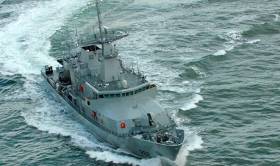Displaying items by tag: Defence Review 2016
Defence Force ‘Naval Service’ Review of 2016
#NavalReview - The Defence Forces in the year of 2016 have been tasked by the Government to play a central role in the 1916 Centenary Commemorative programme.
Notwithstanding the ceremonial activities performed during 2016, Óglaigh na hÉireann maintained operations, contributing to security both at home and internationally in 15 countries and one sea tasked to the Irish Naval Service.
Below is a sample of the breadth of activities undertaken by the Defence Forces (Review) in 2016 in which the Naval Service forms on of three branches the others been the Army and Air Corps.
Afloat has concentrated on highlighting the role of the Naval Service. No fewer than three OPV continued to play a pivotal role last year in overseas missions in search and rescue (SAR) of refugees and migrants in the central Mediterranean Sea off Libya.
*Statistics quoted are provisional to date and are subject to finalisation in the 2016 Annual Report which will be published in early 2017.
International Operations
The Defence Forces have the longest unbroken record of overseas service of any country in the world since first deploying to a United Nations mission in 1958. Some details of the Defence Forces contribution to international peace and security, on behalf of Ireland, are below:
In 2016 over 1400 Defence Forces personnel served in overseas Peace Support and Security operations in 15 countries and one sea. Currently over 600 Defence Forces personnel are serving in 15 countries.
The Defence Forces deployed three Naval ships (Afloat add they were L.E. Samuel Becket, L.E. James Joyce and L.E. Roisin) and over 150 Naval Service and Army personnel to the Mediterranean this year. This was in response to the humanitarian crisis supporting the Italian Marine Rescue Co-Ordination Centre with Search and Rescue assistance.
The total number of migrants rescued in 2016 by the men and women of Óglaigh na nÉireann was 7,029 and over 15,500 since operations began in 2015.
Domestic Operations
The Naval Service has completed over 1,200 boardings and made 3 detentions so far in 2016 for alleged infringements of fishing regulations, the Air corps conducted over 300 Maritime Surveillance Patrol flights.
The Naval Service & Air Corps patrol 220 million maritime acres of sea (over twelve times the land mass of Ireland) representing 15% of Europe’s fisheries.
Naval Service Dive Team were deployed 10 times in 2016 including seven separate Search and Recovery operations following requests from the Coast Guard and An Garda Síochána.
To also read more about the roles of the Army and Air Corps activities in the review click here.





























































